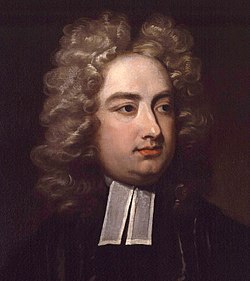- - Quid non mortalia pectora cogis,
Auri sacra fames! - - VIRG., Aen., iii.
This poem partly relates to Wood's halfpence, but resembles the style of Sheridan rather than of Swift. Hoppy, or Hopkins, here mentioned, seems to be the master of the revels, and secretary to the Duke of Grafton, when Lord-Lieutenant. See also Verses on the Puppet-Show. - Scott.
Fair ones who do all hearts command,
And gently sway with fan in hand
Your favourite - Punch a suppliant falls,
And humbly for assistance calls;
He humbly calls and begs you'll stop
The gothic rage of Vander Hop,
Wh'invades without pretence and right,
Or any law but that of might,
Our Pigmy land - and treats our kings
Like paltry idle wooden things;
Has beat our dancers out of doors,
And call'd our chastest virgins whores;
He has not left our Queen a rag on,
Has forced away our George and Dragon,
Has broke our wires, nor was he civil
To Doctor Faustus nor the devil;
E'en us he hurried with full rage,
Most hoarsely squalling off the stage;
And faith our fright was very great
To see a minister of state,
Arm'd with power and fury come
To force us from our little home -
We fear'd, as I am sure we had reason,
An accusation of high-treason;
Till, starting up, says Banamiere,
"Treason, my friends, we need not fear,
For 'gainst the Brass we used no power,
Nor strove to save the chancellor.[1]
Nor did we show the least affection
To Rochford or the Meath election;
Nor did we sing, - 'Machugh he means.'"
"You villain, I'll dash out your brains,
'Tis no affair of state which brings
Me here - or business of the King's;
I'm come to seize you all as debtors,
And bind you fast in iron fetters,
From sight of every friend in town,
Till fifty pound's to me paid down."
- "Fifty!" quoth I, "a devilish sum;
But stay till the brass farthings come,
Then we shall all be rich as Jews,
From Castle down to lowest stews;
That sum shall to you then be told,
Though now we cannot furnish gold."
Quoth he, "thou vile mis-shapen beast,
Thou knave, am I become thy jest;
And dost thou think that I am come
To carry nought but farthings home!
Thou fool, I ne'er do things by halves,
Farthings are made for Irish slaves;
No brass for me, it must be gold,
Or fifty pounds in silver told,
That can by any means obtain
Freedom for thee and for thy train."
"Votre trë"s humble serviteur,
I'm not in jest," said I, "I'm sure,
But from the bottom of my belly,
I do in sober sadness tell you,
I thought it was good reasoning,
For us fictitious men to bring
Brass counters made by William Wood
Intrinsic as we flesh and blood;
Then since we are but mimic men,
Pray let us pay in mimic coin."
Quoth he, "Thou lovest, Punch, to prate,
And couldst for ever hold debate;
But think'st thou I have nought to do
But to stand prating thus with you?
Therefore to stop your noisy parly,
I do at once assure you fairly,
That not a puppet of you all
Shall stir a step without this wall,
Nor merry Andrew beat thy drum,
Until you pay the foresaid sum."
Then marching off with swiftest race
To write dispatches for his grace,
The revel-master left the room,
And us condemn'd to fatal doom.
Now, fair ones, if e'er I found grace,
Or if my jokes did ever please,
Use all your interest with your sec,[2]
(They say he's at the ladies' beck,)
And though he thinks as much of gold
As ever Midas[3] did of old:
Your charms I'm sure can never fail,
Your eyes must influence, must prevail;
At your command he'll set us free,
Let us to you owe liberty.
Get us a license now to play,
And we'll in duty ever pray.
Punch's Petition To The Ladies
Jonathan Swift
(1)
Poem topics: away, faith, freedom, friend, never, silver, beast, good, king, great, room, fast, write, play, town, stay, wall, business, bring, humble, Print This Poem , Rhyme Scheme
Submit Spanish Translation
Submit German Translation
Submit French Translation
<< Sent By Dr. Delany To Dr. Swift, In Order To Be Admitted To Speak To Him When He Was Deaf. 1724 Poem
On A Window At An Inn (epigrams On Windows) Poem>>
Write your comment about Punch's Petition To The Ladies poem by Jonathan Swift
Best Poems of Jonathan Swift
